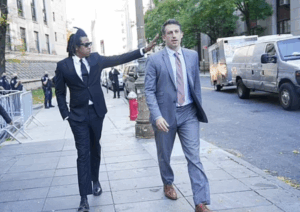In a controversial move, President Trump has declared a "public safety emergency" and will send the National Guard to Washington DC, asserting a crackdown on crime, despite opposing data from local authorities regarding crime trends.
Trump Sends National Guard to DC Amid Crime Control Initiative

Trump Sends National Guard to DC Amid Crime Control Initiative
President Trump announces emergency deployment of National Guard to address crime and homelessness in Washington DC.
President Donald Trump has taken a decisive measure by deploying the National Guard to Washington DC, a move he asserts is aimed at combating rampant crime and homelessness in the capital. During a press conference at the White House, Trump declared a "public safety emergency," announcing the mobilization of 800 National Guard troops to supplement the existing federal law enforcement presence.
"This situation has escalated to one of complete lawlessness," Trump stated, drawing a stark picture of the city, which he claims is under siege from "violent gangs" and "drugged out maniacs." However, local statistics show that contrary to Trump's assertion, violent crime in Washington DC has significantly decreased, with recent reports indicating homicides dropped by 32% from 2023 to 2024, as well as a continued decline of 12% in recent months.
Mayor Muriel Bowser sharply contested Trump's narrative. "We are not experiencing a crime spike," she asserted during an interview, maintaining that the rise in crime in 2023 was part of a national trend, and emphasized ongoing city efforts to enhance public safety. In response to Trump's claims, Bowser labeled the president's viewpoint as "hyperbolic and false," particularly commenting on comparisons made between the city and war-torn regions.
The deployment of National Guard troops is underpinned by the District of Columbia Home Rule Act, which allows for federal control of the police force in specific emergencies. Trump's administration has seized this provision to assume direct oversight of the police department. Despite the sweeping changes, Mayor Bowser remains concerned about the implications of federal oversight, voicing her unease with the National Guard's involvement in local law enforcement."
Additionally, Trump addressed the issue of homelessness in the city, vowing to expel those living on the streets without elaborating on his proposed solutions. Local advocacy groups argued that local efforts have already led to marked progress in reducing homelessness over recent years, with one leader warning that Trump's approach could simply displace vulnerable individuals to less equipped communities.
As the administration's actions unfold, protests have erupted outside the White House, with demonstrators vocally opposing Trump's directive and insisting on the upholding of local governance. Protesters chanted slogans emphasizing their desire to maintain "home rule" in the district, indicating a growing tension between local and federal authorities.
This latest initiative follows Trump's longstanding criticisms of the Democratic leadership in Washington DC, positioning his administration's actions as necessary steps to restore safety and order. Nonetheless, the implications of deploying federal troops to address what many perceive as mischaracterized crime levels in the city leave room for contentious public discourse.





















